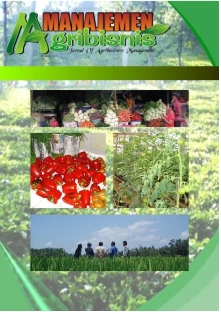Implementasi Model Pemberdayaan Perempuan Berbasis Pengembangan Industri Rumah Tangga Spesifik Lokal Di Kabupaten Karangasem, Provinsi Bali
Abstract
Abstract
Implementation of the Women Empowerment Model Based on Develompment of Household Industrial Specific Local in Karangasem Regency, Bali Province
Empowerment model obtained by Analytic Network Process (ANP) proposed a top priority industrial development strategy of household handicraft is through strengthening human resource competencies. Based on these results, the objectives of the activities are (1) to develop business institutions elected, namely the Joint Business Group (the Kube) in the handicraft industry of coconut shell, (2) increase the capabilities of businesses in terms of production management and marketing, (3) strengthen the institutional in order to the business groups able to utilize the facilities and production technology, as well as improving product marketing functions, and (4) develop a system of household handicraft industry in an integrated manner, supported by marketing management information system based on the web. The research location is the Kube named "Eka Lestari Mandiri", in the village of Abang, District of Abang, Karangasem regency. The analytical method used is descriptive analysis method with a needs analysis approach (participatory need assessment). Suitable business partnership (business matching) realized at the business meeting session between the business group and the business partners through participatory learning and action. The number of respondents was 25 assigned census. The realization of activities to strengthen the competence of human resources carried out by changing the mindset of women of craftsmen through participatory training, strengthening production management and marketing capabilities, and consolidates communication and wider network. The results achieved from the implementation of the empowerment model are (1) the analysis of the needs of business groups, (2) create training modules and conduct participatory training on management of business, (3) conduct technical guidance of production management and marketing, (4) training to strengthen marketing information system web-based, (5) strengthening the institutional oriented to collective business community (socio-business), (6) benchmarking and business partnerships, and (7) monitoring and evaluation of the implementation and follow-up assistance. In the implementation of the strategy of strengthening human resource competencies, the business group of women should be oriented to produce premium quality handicraft, sustained innovation capabilities distinctive product design in order to support the independence of the business as well as the sustainability of the partnership contract.
Keywords: implementation of women empowerment of model, specific local households handicraft industry.













